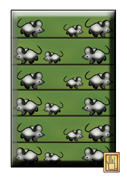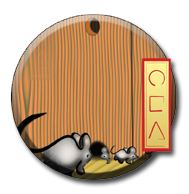On The Way: The Daily Zen Journal
Cat and Mouse
Sheng Yen (1930-2009)
If you have climbed a mountain, you know that sometimes it goes smoothly, while at other times it is difficult. Meditation is like that. Sometimes things go well, but other times you have negative physical and mental reactions. It is normal to sit well for a while and later not do so well. Our physical and mental strength are assets we expend.
A car speeds smoothly along, but it still uses up gas. Similarly, you may sit well, using up energy, and later feel tired. So if you sit well for the time it takes to burn a stick of incense, don’t expect that your practice will always go that well.

For old hands, experienced cultivators, it is different. Without exerting to the utmost, their meditation is like a fine stream that flows on forever. Experienced travelers know how to conserve their energy and nurture it, keeping themselves sharp. A good martial artist will not overuse his moves or squander her strength needlessly. Old hands are like this.
They meditate in a very normal frame of mind, keeping solid and steady, nurturing their strength until it comes forth. They certainly do not let their minds bounce up and down.
More accurately, whether people are old hands does not depend on how long they have been practicing. Being an old hand means carefully studying the methods of practice and using them without wasting physical or mental energy; it means sitting continuously without losing the method.

Chan Master Dahui called this ability “the place of saving power.” People who know how to meditate tie their minds to the practice; people without this skill struggle with illusory thoughts. Tying your mind to your practice means that you are aware you are meditating, somewhat between consciously and unconsciously.
Having discursive thoughts means that you have a stranglehold on the practice; you are tense, strained, and using a great deal of energy, fearing from one moment to the next that illusory thoughts will intrude. Of course they will! If you proceed this way, you will soon collapse from exhaustion. Tying your mind to your practice means that your mind is light and calm, and your body is relaxed.
Once a wise cat catches a mouse, the mouse will not escape. The cat is very casual, as if playing with the little beast. The cat may even let it escape a little, then cut its path and recapture it. It doesn’t tire itself in a frantic pursuit of the prey. Only kittens act nervously, throwing themselves into hot pursuit. Imitate a canny old cat, not a kitten trying to catch a large rat.

When meditating, don’t waste your energy, and don’t go to desperate lengths. You should feel as if you were waiting at ease for a tired enemy—unhurried and relaxed. Deal with obstacles skillfully rather than blundering forward. I have already told you to isolate yourself from outside concerns, to relax, and to be natural. This is the same principle.
We practice Chan to unfurl our wisdom. Wisdom means awakening, or bodhi; it only appears when afflictions drop away. Affliction and bodhi are opposites, but they share the same essence. People whose minds are muddy with afflictions, whose emotions are unstable, are blind to bodhi.
Some people hope to get enlightened but have not thought about changing their disposition. They complacently assume that all they need is a gift from the teacher—a method for getting enlightened. This kind of person thinks: “All I need is to get enlightened. Then I will have wisdom and no longer have afflictions.” This reverses cause and effect! First we should change our disposition and reduce our defiled energy. Only then can we attain wisdom and reach enlightenment.
… So it is a good thing to discover one’s defects and illusory thoughts. The more you know your own deficiencies, the sounder your character can become.

To transform your disposition from a turbid to a clear and pure state, you must take your afflictions and transform them into compassion and wisdom. The milder your afflictions become, the sounder and healthier your mind will be, and this will benefit others. Otherwise, ten seven day retreats won’t do much good. To be really useful to yourself and others, you must take with you the mind of compassion and the mind of wisdom. To reduce afflictions, begin by reducing expectations, seeking, and eagerness for success and gain.
Sheng Yen (1930-2006)
Excerpted from Attaining the Way – A Guide to the Practice of Chan Buddhism – Sheng Yen 2006





Yes, and just so, we have talked about just being there with practice now, feeling its presence in our lives now. Rather than measuring and judging where we are in this process, just feeling the fullness of each moment without overlaying it with extra thoughts and judgments can be enough.
To recognize when we get over-excited, edgy, forgetful, or caught up is also it. Then we can return to our center gracefully, rather than overloading ourselves with negative self-talk. It all just seems to be a part of being human here and now.
However, whether we are “old hands” in practice or eager beginners, “beginner’s mind” is always a gift. To see things freshly, to keep learning, and to not “arrive” is a glorious part of practice/life. To get overly inundated with routine, how many minutes you meditate or don’t, losing that curiosity about practice and life is a kind of dullness that can’t be it.
To allow the moment, the person, the trees and plants, and the impressions to speak to us in the present is what keeps practice fresh and our minds/spirits/hearts enlivened.
We are the present unfolding…
With enthusiasm,
Elana, scribe for Daily Zen